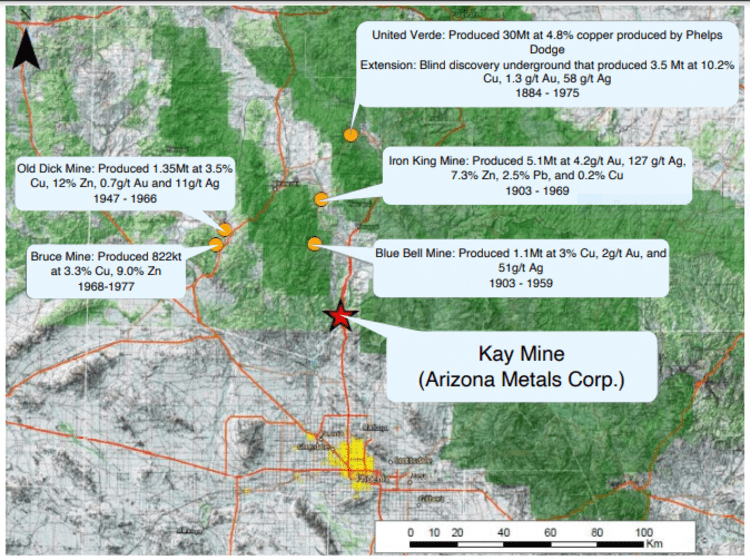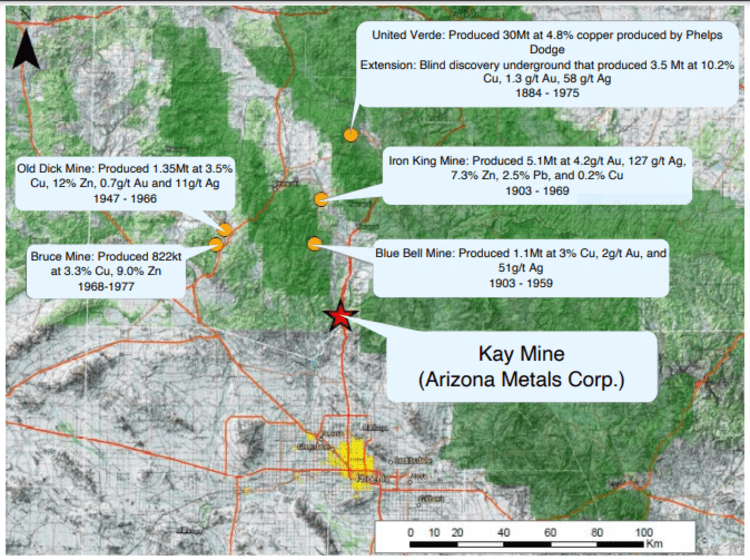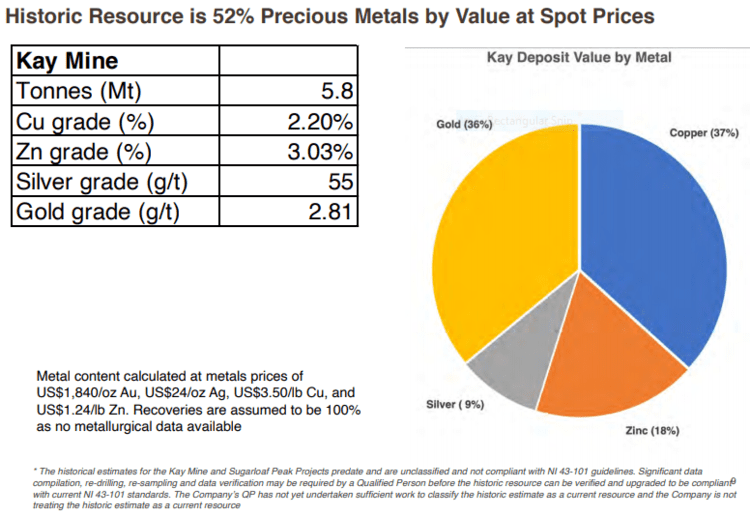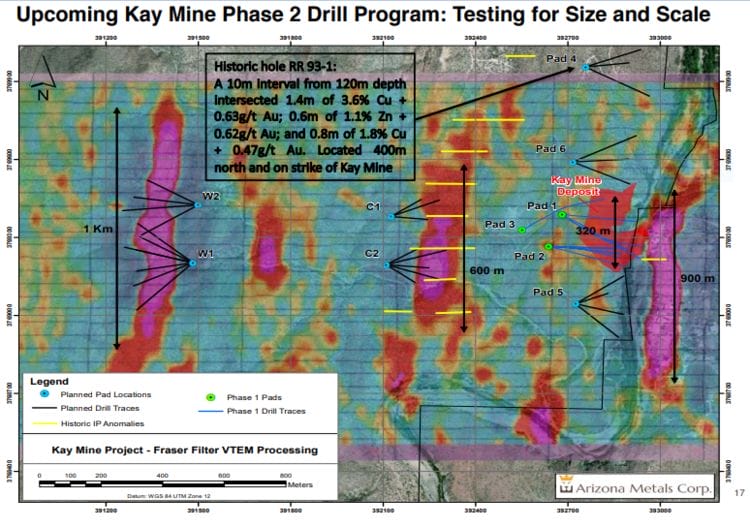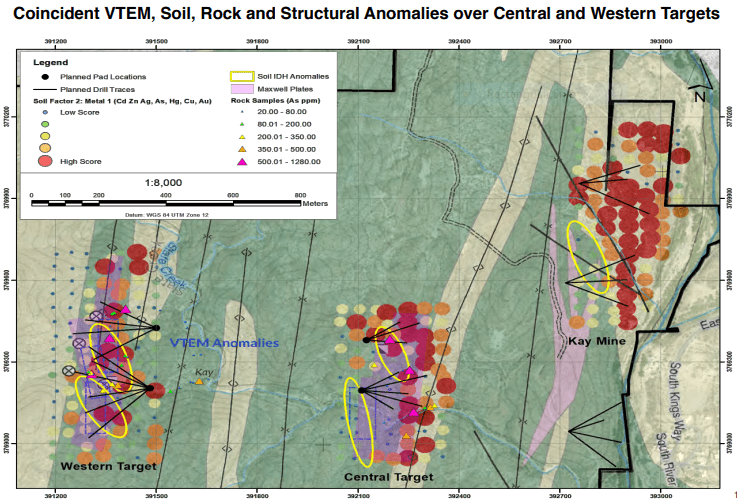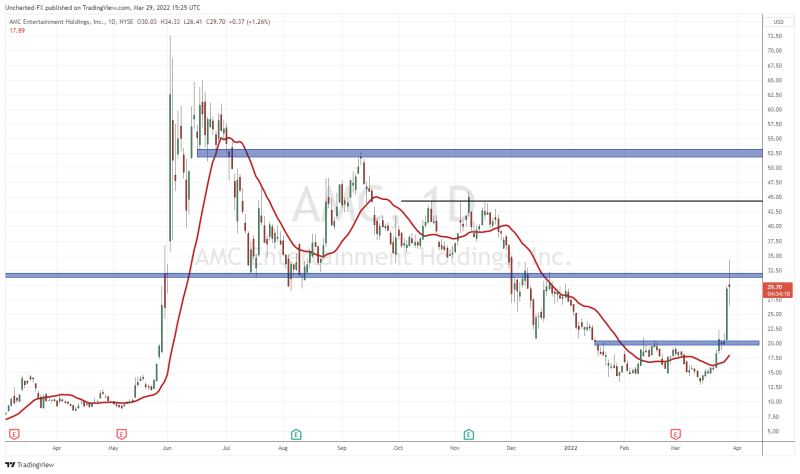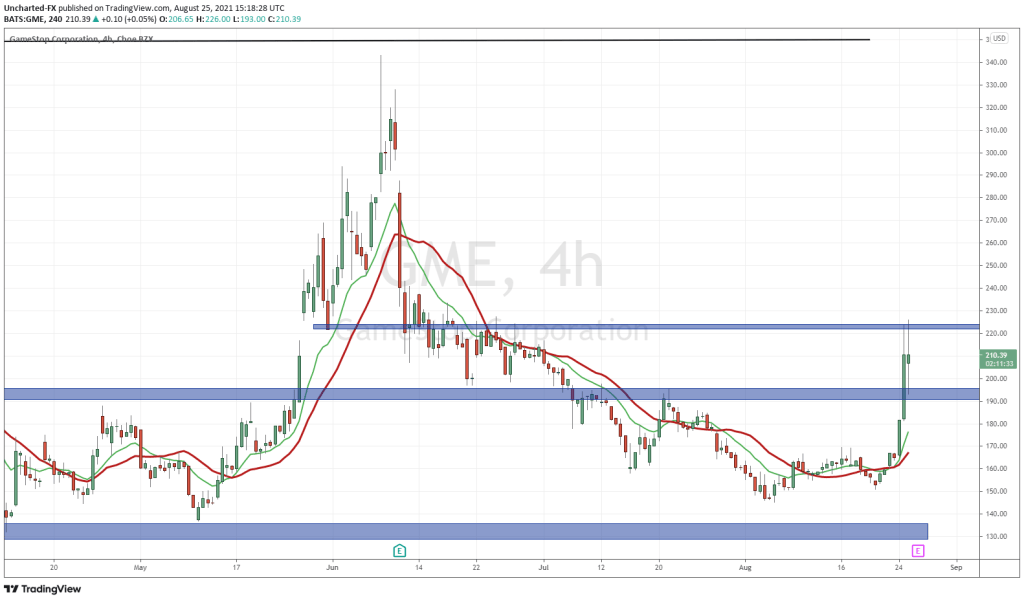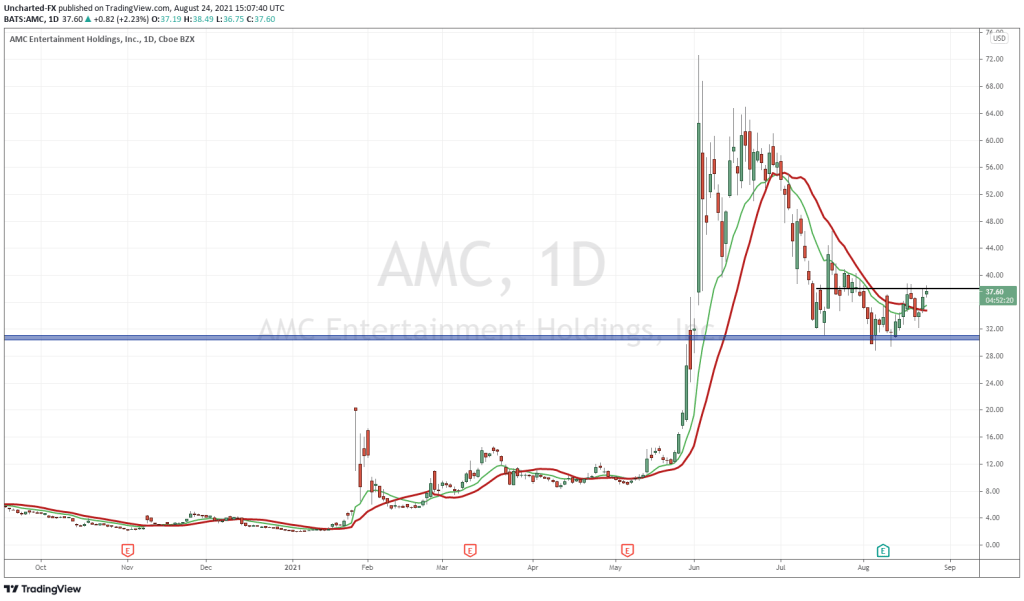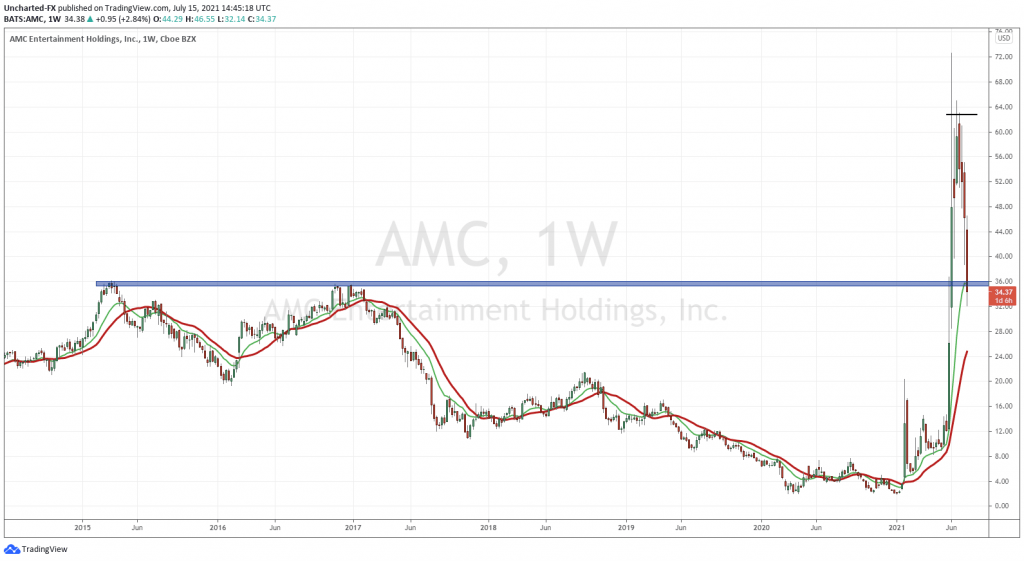One of the better volcanic massive sulphide (VMS) plays we’re aware of—Arizona Metals (AMC.V)—just accelerated a fully-funded Phase 2 drilling campaign at its flagship Kay Mine Project in mining-friendly Arizona.
We like VMS settings here at Guru Central. Their ubiquitous nature being the reasoning—where there’s one deposit or lens, there’s often another, and another.
These polymetallic lenses, though often modest in size, can hold huge concentrations of metals.
The Kay project is located in a particularly prolific VMS setting—a region where roughly 4 billion pounds of copper was produced over its century-long run… a region host to 60 past-producing underground Cu-Au-Zn VMS mines, all within a 150-kilometer radius of this highly prospective asset.
The copper grades in this district typically ran 3.5%.
There is a historic resource at Kay. In the early 1980s, Exxon Minerals delineated 5.8 million tonnes grading 2.2% Cu, 3.03% Zn, 55 g/t Ag, and 2.8 g/t Au for a CuEq grade of 5.8% ***
Without taking into account recovery rates, the precious metals component of this historic resource runs higher than most VMS deposits.
The following are some of the better intercepts from a Phase-1 drilling campaign completed last August—a campaign where 19 of the 20 holes drilled hit their (massive sulphide) mark.
- 43.1 meters grading 3.94% CuEq (incl. 15.2m of 6.7% CuEq), from a depth of 341 meters;
- 38.4 meters grading 2.9% CuEq (incl. 12.5m of 6.0% CuEq), from a depth of 385 meters;
- 39.9 meters grading 3.4% CuEq (incl. 3.5m of 11.6% CuEq, and 3.5m of 6.6% CuEq) from a depth of 314 meters;
- 22.5 meters grading 2.4% CuEq (incl. 0.8m of 14.0% CuEq and 4.1m of 5.2% CuEq);
- 27.6 meters grading 2.9% CuEq (incl. 3.5m of 6.7% CuEq) from a depth of 423 meters;
- 6.1 meters grading 7.8g/t AuEq (incl. 4.4m of 9.3g/t AuEq) from a depth of 570 meters;
- 6.8 meters grading 7.3g/t AuEq (incl. 4.3m of 10.1g/t AuEq) from a depth of 422 meters.
Those are some nice CuEq grades. Have you been watching copper lately?
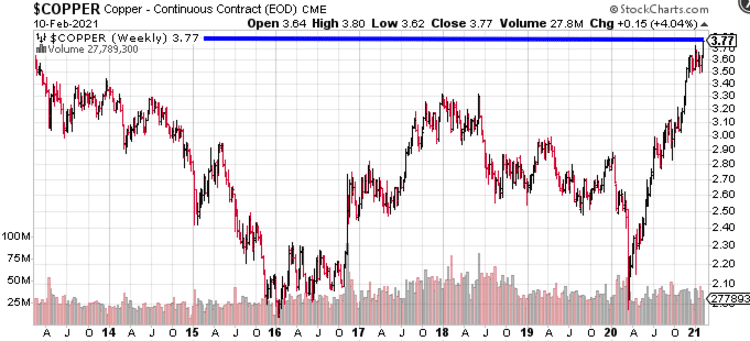
Damn!
On January 7th of this year, the Company launched a Phase-2 (minimum) 11,000-meter drill program at Kay to test for new VMS lenses in the anticlinal hinge zones identified to the north and south of recent drilling, as well as the up-plunge and down-plunge extensions of known hinges.
Arizona Metals Corp Commences Kay Mine Phase 2 Expansion Drill Program
The following map illustrates the location of the historic Kay deposit relative to the pad locations for this Phase-2 (29 hole) campaign…
Taking it up a notch, on February 8th, the Company added a 2nd rig to the program…
The 2nd rig was mobilized to the project on February 3rd and is turning as I type.
“This addition will accelerate drilling under the fully-funded Phase 2 program, which will consist of a minimum of 11,000 m in 29 core drill holes. This expansion drill program will test for new VMS lenses in anticlinal hinge zones identified to the north and south of recent drilling, as well as the up-plunge and down-plunge extensions of known hinges (image below). Drilling will begin at the Kay Mine targets and progress to targets on strike (north and south) of the Kay Mine, and then to Central and Western targets as permitting is completed (above map). Permitting is currently underway for these targets and is progressing well.”
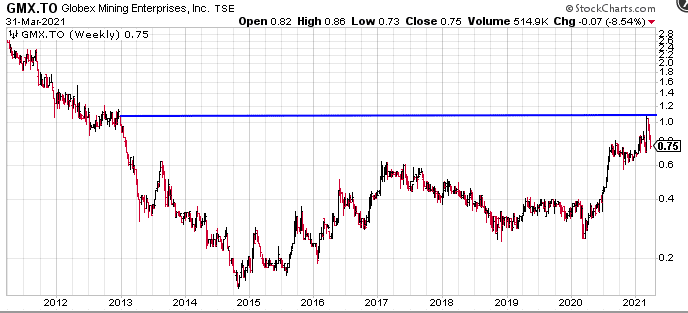
A thorough review of Phase-1 drilling set the stage for Phase-2.
This data review, with the help of SRK Consulting (Canada), included 1,202 spectral alteration measurements combined with digitized historical data and structural mapping to “undertake sulphide lens modeling and fold modeling to identify new drill targets.”
Translation: the Company is using good science to prioritize its drill targets.
“Arizona Metals completed spectral analyses to map alteration within and away from the mineralized zones. These data were used by SRK to define five alteration types, which can be used as vectors towards mineralization.”
SRK determined that the thickest and most continuous sulphide lenses are located in the anticlinal hinges.
These anticlinal hinges represent the highest priority drill targets (numbered 1 through 8, map below)…
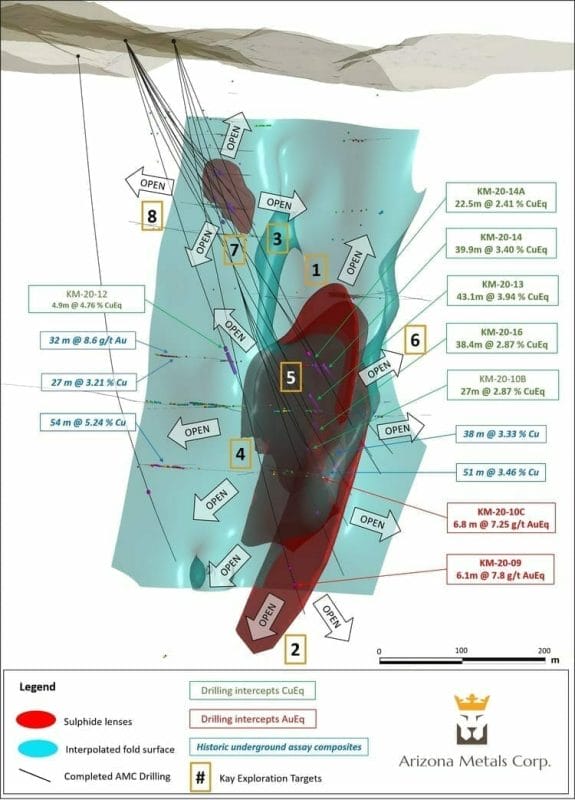
The following excerpt from my maiden Arizona Metals piece last October will help shed some light on the “folded hinges” the Company is targeting…
The geological model at Kay is that of an isoclinal folded VMS deposit.
The analog here might be the uber-rich VMS deposits that straddle the provinces of Ontario and Quebec, along the prolific Abitibi Greenstone Belt. The world-class Kidd Creek mine in the Timmins Camp and the Horne mine in Rouyn-Noranda (Quebec), come to mind.
Previous Kay operator, Exxon Minerals, reported 18 vertically stacked lenses that range from 5 meters to 25 meters in thickness.
Exxon reported that Kay’s tightly folded hinges within these lenses demonstrate superior grades and widths.
One of the objectives of currently drilling is to delineate these unique (high-grade) geological features and grow Kay beyond its current 5.8M tonnes.
The Kay deposit starts at a depth of 120 meters. The company believes mineralization extends to depths greater than one kilometer.
The video link below is a 3D representation of Kay’s subsurface geology. It also gives us some insight into this folding sequence…
This Feb. 8th press release went on to state that the Company met in person with newly-elected Yavapai County Supervisor, James Gregory, and Senator Karen Fann, who was recently re-elected as President of the Arizona State Senate.
The purpose of the visit was to introduce Mr. Gregory to the Kay Mine project and to apprise Senator Fann of new developments since her last visit in early 2020.
At the end of the tour, Senator Fann commented:
“As the State Senator for this area, I am pleased to see the continued progress of Arizona Metals at its Kay Mine project since my first visit last year. I am very excited to have this company and project in my district, as Arizona Metals Corp. is the kind of company and operation we want to see in rural Arizona. The company continues to employ a thoughtful approach to doing things the right way, and this project has the potential to ultimately create hundreds of jobs and dynamic economic activity in the district.”
Nice praise from a powerful politician, this.
Clearly, AMC management is running a tight show at Kay.
Marc Pais, AMC’s CEO, wrapped up the site tour with…
“We very much appreciate both Supervisor Gregory and Senator Fann committing time in their very busy schedules to meet with us. We continue to operate in Arizona with the highest respect for the community, as good neighbors, as well as with the highest of environmental standards, towards the goal of advancing the Kay Mine to a production decision. The addition of the second drill today will allow us to accelerate and expand the Phase 2 drill program, designed to test previously defined targets both on strike and to the west of the Kay Mine.”
Final thought
The Company has been drilling with a single rig for over a month. This 2nd rig will accelerate the program, essentially doubling the meters drilled per day, augmenting the assay related headlines that will flow out of this highly prospective project.
I haven’t chatted with management in a few months, but I would expect results to follow a similar pattern to that of the 2020 campaign—a steady roll, released in batches.
Personally, I’m looking forward to rig mobilization to the Central and Western targets.
New VMS discoveries have a way of nabbing the market’s attention.
END
—Greg Nolan
Full disclosure: Arizona Metals is an Equity Guru client.
*** The Kay Mine historic estimate has not been verified as a current mineral resource. None of the key assumptions, parameters, and methods used to prepare the historic estimate were reported, and no resource categories were used. Significant data compilation, re-drilling and data verification may be required by a Qualified Person before the historic estimate can be verified and upgraded to be a current mineral resource. A Qualified Person has not done sufficient work to classify it as a current mineral resource, and Arizona Metals is not treating the historic estimate as a current mineral resource.

